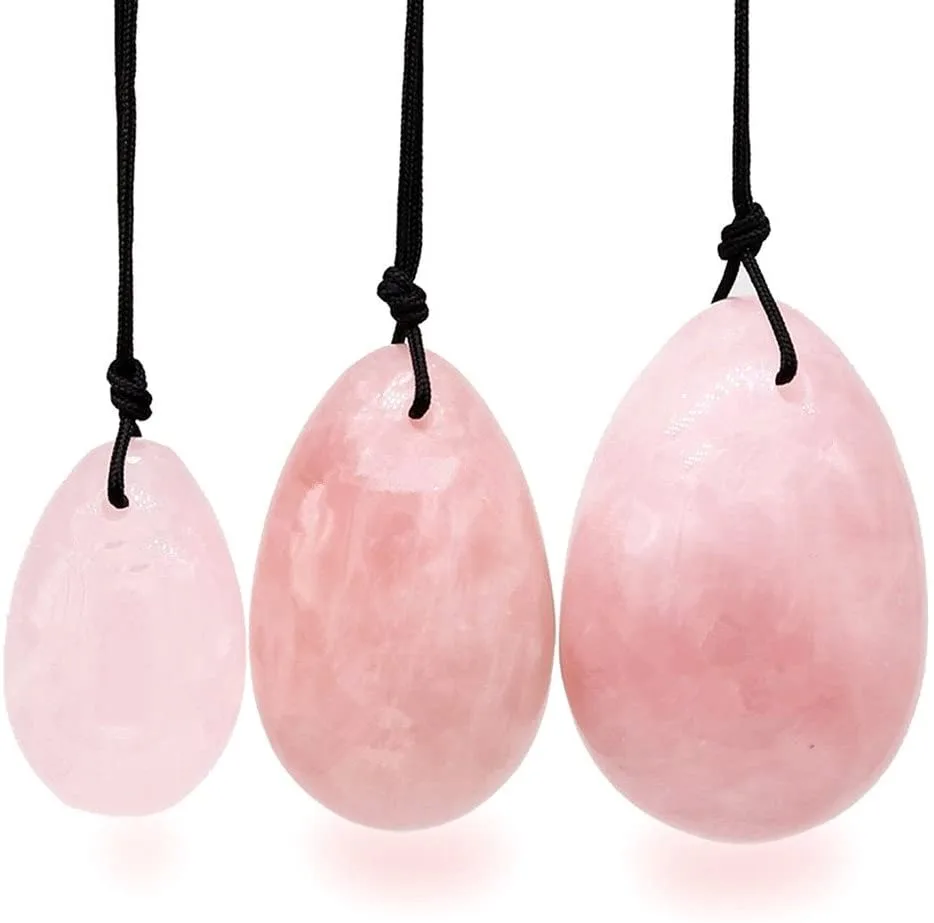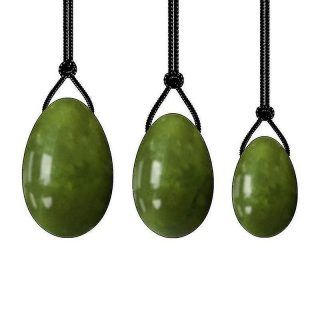Would you believe that since the start of February Google searches for ‘Yoni Eggs’ have increased by 9300%. Yoni egg, jade egg, or love egg – are names of the egg-shaped crystals that women are placing inside their vaginas, on the promise that it will strengthen the pelvic floor, enhance sexual pleasure, balance hormones, as well as promote health and wellness of organs such as the bladder and uterus.
So what’s all the fuss about?
The word “yoni” means sacred space and is the symbol of Goddess in Hinduism. Today, it is also used to reference the vagina and vulva. The yoni egg is a semiprecious stone that is inserted into the vagina for up to 12 hours a day to supposedly enhance certain physical and spiritual healing properties.
You insert a yoni egg like a tampon – it’s inserted into the vagina, and gently pushed, allowing the muscles to lift the egg up to the cervix. The stone is meant to give the muscles something to squeeze around.
Benefits or not?
Yoni egg enthusiasts claim the benefits are physical and spiritual. Some believe that once vaginally inserted, the body is able to harness the energy intrinsic to the stone.
“In ancient medicine, crystals and gemstones were thought to be imbued with a distinct frequency of unique energetic, healing properties,” says Alexis Maze, founder of Gemstone Yoni, a sex toy company that specializes in crystal dildos and yoni eggs.
Additionally, because the body must “grip” the egg to keep it inside the vagina, sellers claim jade egg use also strengthens vaginal muscles. It’s suggested that inserting a jade egg causes your body to do an involuntary kegel, ultimately strengthening the pelvic floor.
Goop, a wellness and lifestyle brand founded by actress Gwyneth Paltrow, also promotes yoni eggs. Goop has asserted that regular jade egg use can help balance your hormones and quell symptoms associated with PMS.
Is there any research or physical evidence to support this?
While the benefits may appeal to those looking to increase their libido, ease cramps, and balance hormones, there’s little to no scientific research on the benefits of using a yoni egg. As far as pelvic floor training goes, proper pelvic floor training involves contracting and relaxing those muscles.
 In fact, the opposite is true. Continuously contracting the pelvic floor muscles, which jade egg insertion requires, can create tension in the pelvic floor. This can create a cascade of issues in the body, says Amy Baumgarten, CPT and holistic movement coach at Allbodies, an online platform for reproductive and sexual health.
In fact, the opposite is true. Continuously contracting the pelvic floor muscles, which jade egg insertion requires, can create tension in the pelvic floor. This can create a cascade of issues in the body, says Amy Baumgarten, CPT and holistic movement coach at Allbodies, an online platform for reproductive and sexual health.
Were the eggs used in ancient practices?
Marketers of the product also claim jade eggs have a rich history as far back as over 5,000 years ago. Some even suggest that empresses and concubines of the Royal Palace of China used eggs carved out of jade to access sexual power.
Again, there’s no evidence that jade eggs were ever used vaginally in ancient Chinese culture. None at all. Anywhere…
In a 2019 study titled Vaginal Jade Eggs: Ancient Chinese Practice or Modern Marketing Myth? by researchers set out to identify evidence that vaginal jade eggs were recommended or used in sexual health practices or for pelvic muscle exercises in ancient Chinese culture.
Their findings?
More than 5000 jade objects were viewable in online databases. No vaginal jade eggs were identified.
Their conclusion? No evidence was found to support the claim that vaginal jade eggs were used for any indication in ancient Chinese culture.
There are those who would argue that not only does this claim perpetuate false stereotypes of Chinese medicine, it also disrespects and diminishes Chinese culture.
What are the dangers of using a yoni egg?
There’s a lot of misinformation about the yoni egg. In fact, back in 2018, Goop recovered a $145,000 (£112,000) lawsuit for making unscientific claims about vaginal eggs.
Not only are the benefits of a yoni egg unproven, but using them can be extremely dangerous to your vagina health. When inserting the stone into your vagina, you are at risk of infection. The material of the egg means that it has microscopic holes and cracks, which can harbor bacteria and make the egg hard to be cleaned or sterilized between uses.
When the bacteria is left on the egg without being properly cleaned it can cause bacteria, bladder and yeast infections. If you have a vaginal infection before using a yoni egg, you are at risk of further infection as it is reintroduced into the vagina every time the egg is used.
Other risks associated with using a yoni egg
Another potential risk of using a yoni egg is getting is stuck in your vagina. You may scratch the vaginal wall when trying to remove it. Some eggs have strings that make retraction easier, but unfortunately, some do pose the risk of having it removed by medical professionals.
Having a yoni egg stuck in your vagina for a long period increases the risk of other internal health problems. For example, damage to the vagina tissue. TikTok user warns others that the crystals can wear away over time due to the acidic nature of the vagina, making them unsafe and unsanitary.
The main concept of a yoni egg is to squeeze the vaginal muscles, but constant contractions can cause muscle strain. This can lead to Vaginismus, a condition that causes the vaginal muscles to involuntarily contract when things are inserted into the vagina, like a tampon, penis, or sex toy.
What are the safer alternatives to a yoni egg?
There are many other proven methods to treat some of the problems that a yoni egg supposedly solves. When it comes to strengthening the pelvic floor muscles, there are exercises you can add to your daily routine that will help to improve your bladder and bowel function, and even your experience of childbirth.
If you’re trying to heighten sexual pleasure and reach orgasm, then stimulation is an alternative to the controversial yoni egg. Women can reach orgasm through clitoral stimulation, vaginal stimulation and other sensory pathways such as breast stimulation or other erogenous zones.
The form of tension that helps women reach orgasm is muscle tension. Women have a higher chance of reaching climax if they incorporate leg, abdominal, and buttock tension.
 Reducing menstrual cramps is one of the main selling points for yoni eggs. Some claim they balance menstrual cycles and soothe cramps. There are easier and safer ways to help relieve cramps, you can try drinking herbal tea, taking a hot bath, using a hot water bottle, or exercising.
Reducing menstrual cramps is one of the main selling points for yoni eggs. Some claim they balance menstrual cycles and soothe cramps. There are easier and safer ways to help relieve cramps, you can try drinking herbal tea, taking a hot bath, using a hot water bottle, or exercising.
The bottom line
Why would anyone willingly place a rock up their sensitive private parts? Well, perhaps the answer lies in the mastery of marketing and those media who appear to be profiting from this fast-growing trend. Sadly, it seems scientific studies, specialist advice, and even plain common sense have all fallen by the wayside when it comes to the allure of the yoni egg.
References
Study: Vaginal Jade Eggs: Ancient Chinese Practice or Modern Marketing Myth? by
Healthline.com: Jade Egg, How it Works: https://www.healthline.com/health/jade-egg#how-it-works



 Having a yoni egg stuck in your vagina for a long period increases the risk of other internal health problems. For example, damage to the vagina tissue.
Having a yoni egg stuck in your vagina for a long period increases the risk of other internal health problems. For example, damage to the vagina tissue. 

![women [longevity live]](https://longevitylive.com/wp-content/uploads/2020/01/photo-of-women-walking-down-the-street-1116984-100x100.jpg)









